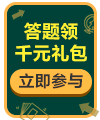全国教师资格统考《英语学科知识与能力(初中)》模拟试卷二
23. Which of the following is TRUE about the MAP IT OUT activity?
A. Parents are forbidden to be involved in the activity.
B. Children can learn to read a map and take a correct school bus.
C. Parents are expected to drive their kids to school if possible.
D. Children walk to school together accompanied by one or more adults.
24. What’s the meaning of the underlined words in paragraph three?
A. The behavior to make the children to be green.
B. The behavior to make the children to learn to protect the envirment.
C. The behavior to make the children to learn saving.
D. All of the above are right.
25. The passage is most probably intended for ____.
A. teachers B. parents C. children D. headmasters
请阅读Passage 2,完成26~30小题。
Passage 2
Mom was right! If you say thank you, for even the smallest gift or slightest show of kindness, you’ll feel happy.
Gratitude, says Robert A. Emmons, a professor of psychology at the University of California, is an important element of happiness. In his recent book, Thanks! Emmons uses the first major study on gratitude to prove mom’s point.
As one of the leading scholars of the positive psychology movement, he admits gratitude may be difficult to express. He advises you to begin by admitting that life is good and full of events and elements that make daily existence a wonder. Second, recognize that the source of life’s goodness is more than just you. That source may be your mom, a friend, partner, child, colleague at work or play.
Gratitude is always other-directed, notes Emmons. You can be pleased or angry with yourself and feel guilty about doing something wrong, but you can never be grateful to or for yourself.
Expressing gratitude shouldn’t be a reaction; it should be a state of mind. To feel grateful when life is a breeze and you have more than you need is easy. To feel grateful in time of crisis—anger, hatred and bitterness—is easier. Also, too many people are aware of life’s blessings only after these are lost.
It’s crisis and chaos—danger, disease, disability and death—that bring many individuals to realize just how dependent they are on others. Yet it’s the way each of us begins life and ends it. It’s too bad that so many people waste those decades in between laboring under the illusion(幻觉) they are self-sufficient, says Emmons.
The abundance of voices expressing gratitude from his studies of individuals with chronic health problems is many. But Emmons goes beyond his “groundbreaking” science to make his case for gratitude by including the inspirational writings of philosophers, novelists and saints, as well as the beliefs of various religious and their respective scripture(经文). Take together, these observations are summed up quite nicely by famous humanist Albert Schweitzer, who said the secret of life is “giving thanks for everything”.
To enable and embrace gratitude, Emmons encourages the readers of Thanks!to keep a gratitude diary. He even provides easy-to-follow directions on how to practise and develop gratitude.
I’m not a reader or advocate of self-help books, but I am thankful for the reference I found in a newspaper article to the research Emmons was conducting on gratitude involving organ donors and recipients. The chance discovery led me to this book.
Mom implied that kindness seems to find its way back to the giver because life really is all about giving, receiving and repaying. So I’ll pay attention to her professional advice and say: Thank you, professor Emmons.
26. What is the text mainly discussed?
A. There are many ways of being thankful.
B. Gratitude is important to happiness.
C. Mom is great for her being thankful.
D. Being thankful will keep you fit.
27. The author mentions Robert A. Emmons’ book Thanks! in order to prove that _____.
A. Professor Emmons supports mom’s study on psychology.
B. mom is as great a psychologist as Professor Emmons.
C. Professor Emmons is a famous psychologist.
D. mom is right about her viewpoint on gratitude.
28. It will be easier for you to feel grateful when______.
A. you live a comfortable life
B. you receive gifts on your birthday
C. you get help during your hard times
D. you are congratulated on your success
(责任编辑:李明)




















